Germany Denies Import Of Crude Oil, Petroleum Products From Iran
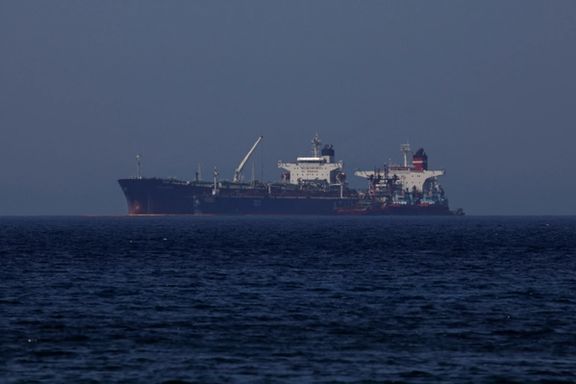
Germany's Federal Office for Economic Affairs and Export Control (BAFA) denied the import of crude oil and petroleum products from Iran.

Germany's Federal Office for Economic Affairs and Export Control (BAFA) denied the import of crude oil and petroleum products from Iran.
Eurostat, the European Union's statistical office, reported on Monday that Germany has imported crude oil or petroleum products for the first time in five years from Iran.
Based on the report, Germany imported 69,737 metric tons of crude oil or petroleum products from Iran in March of this year. The country's last import of Iranian crude was 10,000 mt in October 2018.
However, BAFA told Iran International’s correspondent Ahmad Samadi on Wednesday that there was a mistake in the reporting by the Eurostat.
“The import about 70.000 tons from Iran is wrongly declared. These quantities originally come from Mexico.”
BAFA also added that Eurostat has corrected this mistake in its data.

According to the German Federal Statistical Office, the trade volume between Tehran and Berlin has decreased dramatically.
The country's exports to Iran in April 2023 have decreased by 28% compared to the last year.
According to the figures, exports to Iran in April this year decreased by over 32 million euros reaching 82,826,000 euros.
Imports from Iran in April 2023 were around 17 million euros, which has dropped by 22.6% compared to the same period last year.
German exports to Iran include chemicals, machinery, and food products, and on the other hand, Iran has exported mostly food products to Germany.
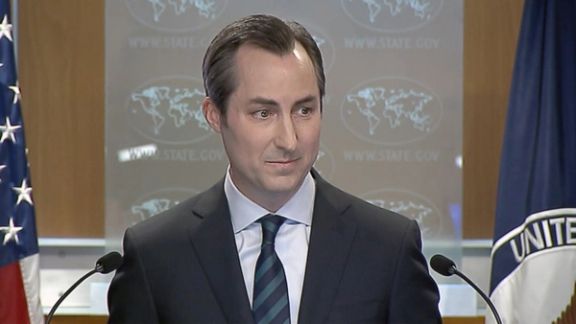
The United States has finally confirmed it allowed Iraq to release $2.7 billion of its debts to Iran.
The mechanism by which the money would be released remains murky, but Washington claims it is part of a number of humanitarian transactions which have been taking place consistently over years since the previous administration.
Speaking in this week’s press briefing, Matthew Miller, spokesperson for the US Department of State, told reporters: “Iran can only access its funds held in accounts for Iraq for humanitarian and other non-sanctionable transactions.”
He told reporters the transaction is consistent with US law and in full coordination with the Government of Iraq while all Iran-related sanctions continue to be upheld.
Iraqi Foreign Minister Fuad Hussein was reportedly given the clearance during a meeting with US Secretary of State Antony Blinken on the sidelines of the Riyadh Conference on June 8, according to Reuters.
The Iraqi foreign ministry source said that the funds will be transferred through the Commercial Bank of Iraq and Iranian officials have confirmed that the money will be used for Iranian Hajj pilgrims' expenses and foodstuffs imported by Iran.
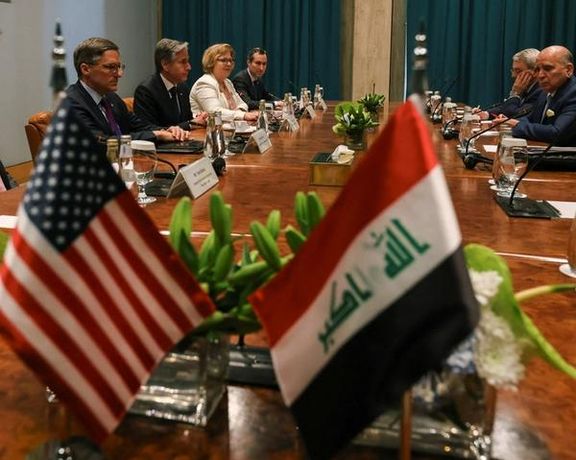
In spite of reports worldwide, the US continues to deny its being in direct talks with Iran over a return to the nuclear deal. Miller said that recent reports have been “false” or misleading, claiming the channels of communication have always been open.
As reporters' questions became more intense, Miller was increasingly uncomfortable, tripping over his words and backtracking as things heated up. A barrage of questions were thrown at the spokesman whose standard lines were clearly not cutting it in light of the Iraq revelations and the obvious frustration reporters felt by the ongoing denials of the Oman talks.
“We have always had the ability to deliver messages to Iran when it’s in the interests of the United States to do so,” he said, undermining the meeting which took place in Oman, repeating the Biden administration’s standard line that diplomacy is the best means to ensuring Iran does not obtain a nuclear weapon in spite of its having reached terrifying limits.
So seriously has the meeting and its outcome been taken by Iran’s adversaries, Israeli Prime Minister Benjamin Netanyahu addressed the matter in the Knesset Foreign Affairs and Defense Committee meeting on Tuesday.
He openly stated there is very much a deal underway between the US and Iran, reasserting claims that "no agreement with Iran will be binding on Israel, which will continue to do everything to defend itself."
Referring to Iran, he told MKs that “over 90% of our security problems stem from Iran and its proxies, and our policy is aimed at increasing the circle of peace, to stop Iran and its proxies”, no matter what deals are struck between Iran and other nations, emphasizing the government’s “opposition to a return to the original [JCPOA] agreement”.
He admitted there are still differences of outlook on the matter between Israel and its largest ally, the US, not only about JCPOA but also about smaller agreements.
The revelations come amidst a busy diplomatic week for Iran, which this week, saw its chief unclear negotiator, Ali Bagheri-Kani, meet representatives of the E3, Britain, France and Germany, in Abu Dhabi on Tuesday.
Christian Turner, Director General Geopolitics and Political Director at the UK’s Foreign and Commonwealth Office, remained tight-lipped on the nature of discussions, only tweeting: “The discussion covered a wide range of issues of mutual interest and concern.”
To have taken place in Abu Dhabi shows the importance of Tehran’s ties to its Arab Gulf neighbours and adversaries, which are taking a key role in facilitating a peaceful resolution to Iran’s ongoing nuclear armament, which, on Abu Dhabi’s doorstep, keeps its leaders awake at night.
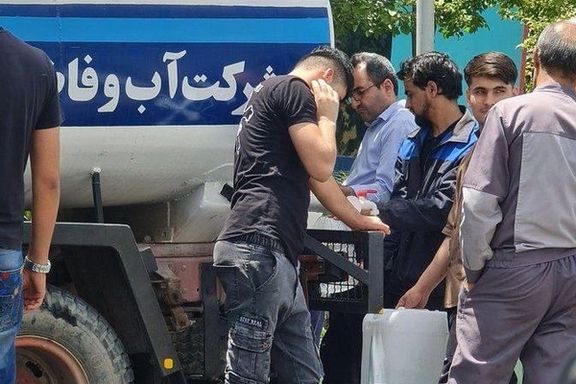
Citizens of Tehran and Karaj had drinking water cuts for the fourth day in a row this week as the situation worsens.
While the Tehran Water and Sewage Company recently promised the water issue in the capital would be solved, it spread to new neighborhoods with many communities having no access to drinking water.
According to citizens, it’s been over 72 hours since the residents of Motahari, Sattar Khan, Vanak and other neighborhoods have been complaining about frequent water cuts.
Mohammadreza Bakhtiari, the former CEO of Tehran Water and Sewerage Company has spoken out against the supply issues, claiming about one-fifth of the city's drinking water is wasted due to the worn-out water supply network.
However, in a bid to divert blame, the regime advises the population to be responsible, urging that a more frugal use of water is the way to resolve the issue.
In recent years, many cities across the country witnessed scenes of massive protests against the authorities’ mismanagement of water resources or harmful dam building and politically motivated diversion of rivers that have devastated agriculture and drinking water sources.
Iran has been suffering from drought for at least a decade and officials have been warning of a further decrease in precipitation.

A member of the French parliament claims efforts have begun to vote for designation of the Islamic Revolutionary Guard Corps.
In an exclusive interview with the Persian Service of Radio Free Europe in Prague, Radio Farda this week, Éléonore Caroit stated that so far there were technical and judicial obstacles to proscribe the IRGC, but the preparations for the motion have already been made.
A group of lawyers including seven French and Iranian solicitors, said they have concluded with legal investigations that contradict EU Foreign Policy Chief Josep Borrell's claims that there are legal obstacles to designating the IRGC as a terrorist organization.
The group is now consulting with the French parliament and government to approve and implement the resolution.
On Sunday, Éléonore Caroit participated in a protest rally in Paris to condemn Europe’s relations with the ruling regime.
The European Parliament overwhelmingly passed a resolution in January calling on the EU and member states to designate Iran’s Revolutionary Guard as a terrorist group.
The resolution demanded that Iranian authorities end the crackdown on popular protests that started last September after 22-year-old Mahsa Amini was killed in morality police custody.
It also demanded that Europe sanction the Islamic Republic’s Supreme Leader Ali Khamenei and its president Ebrahim Raisi.
"It is something that cannot be decided without a court decision first. You cannot say I consider you a terrorist because I don't like you," Josep Borrell, the EU's high representative for foreign affairs, told reporters in Brussels.
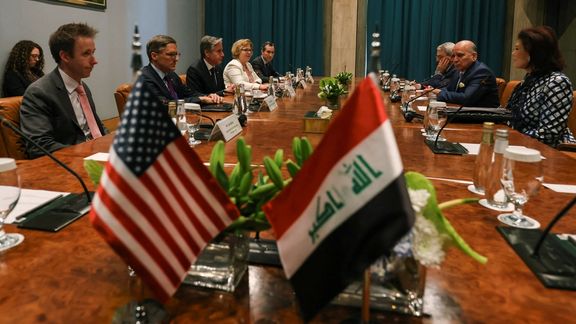
The United States is said to have given Iraq permission to pay $2.7 billion of its debts to Iran but the mechanism by which the money would be released remains murky.
Iraqi Foreign Minister Fuad Hussein was reportedly given the clearance during a meeting with US Secretary of State Antony Blinken on the sidelines of the Riyadh Conference on June 8, Reuters cited a senior Iraqi official, who spoke on condition of anonymity.
The Iraqi foreign ministry source said that the funds will be transferred through the Commercial Bank of Iraq and Iranian officials have confirmed that the money will be used for Iranian Hajj pilgrims' expenses and foodstuffs imported by Iran.
Iranian officials have claimed that the money in Iraqi banks could be as much as $10 billion or more. Yahya Al-e Eshaq, the head of the Iran-Iraq chamber of commerce, was quoted as saying by the local media Saturday that the Iraqi debt is between $7 to $8 billion but only $2.7b has been agreed to be released and that part of the funds has been earmarked for pilgrims and another portion has been used to purchase basic goods.
On Monday, Iranian lawmaker Hassan Norouzi claimed that the money will be provided to the Hajj pilgrims in forms of subsidies to buy dollars at a slightly lower rate than free market. However, he criticized the decision, saying that the money belongs to all Iranians and not a small number of affluent individuals, who can afford the Hajj pilgrimage in the first place.
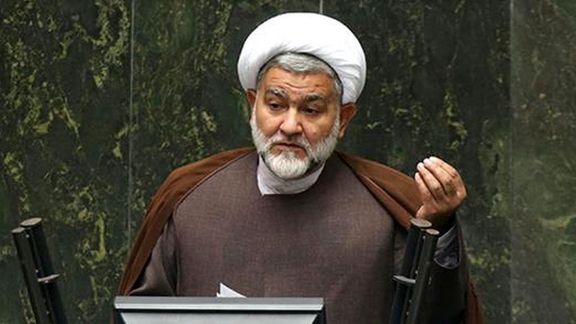
Norouzi, who is the vice-chairman of the Judicial and Legal Committee of the parliament, pointed to the country’s dire economic situation, calling the scheme "a definitely wrong move."
"This money belongs to the entire nation and should be spent for the sustainable goals of the Iranians,” he said. It is better “to spend the money on Tehran’s water, so that residents of the capital would not have to drink water contaminated by nitrate.”
The annual Islamic pilgrimage to Mecca, Saudi Arabia -- the holiest city for Muslims -- is a mandatory religious duty that must be carried out at least once in their lifetime by all adult Muslims who are physically and financially capable of undertaking the journey. This year Hajj ceremonies will be held around late June through early July and the average price for Iranians to go to the journey is about $5,000, a rate set by the host country Saudi Arabia.
The key condition for the pilgrimage is physical and financial ability of the applicants. If the government is supposed to subsidize the journey, then it is not a real pilgrimage.
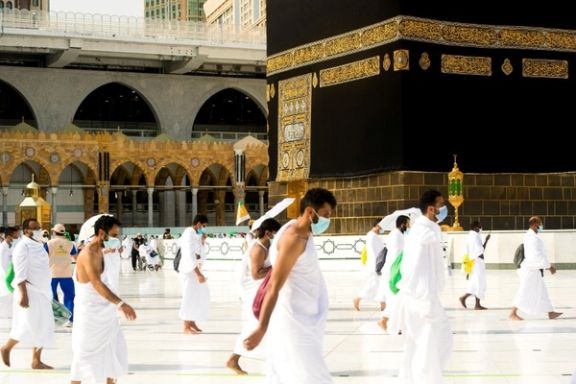
The Iranian government organizes and controls the Hajj pilgrimage, including paying Saudi Arabia in US dollars for the expenses of each traveler, and providing dollars to pilgrims to spend during their journey. But instead of charging each pilgrim the full amount based on high free market exchange rate, it provides these dollars at a low preferential rate, in effect subsidizing the pilgrimage.
However, the total amount of the subsidy would still be a tiny fraction of the $2.7 billion that is reportedly about to be unblocked, considering that the number of the pilgrims is at most 80,000 people. The total subsidy the government would spend on pilgrims this year will be around $200 million.
The question is how Iraq plans to release the $2.7 billion including whatever has been designated for pilgrims. Officials of all three countries are silent on the issue. If a few hundred million dollars is set aside for pilgrims, would it be transferred to Saudi Arabia as payment for expenses? Or cash dollars will be provided to the Iranian government, which would violate the purpose of US banking sanctions to begin with.
Multiple reports this week suggest the US is offering financial incentives to the Islamic Republic in exchange for Tehran slowing its production of enriched uranium. Late in May, Iran International ported that the United States was offering to release Iran’s funds held in Iraq and South Korea in exchange for Tehran to show more flexibility on issues related to its nuclear program, and the release of American dual nationals held hostage in Iran.
A week later, on June 7, Haaretz confirmed the report saying that the United States was offering to release $20 billion in frozen Iranian funds — currently held by South Korea, Iraq, and the International Monetary Fund — in exchange for Iran limiting further production of high-enriched uranium.
Another report on June 8 by Middle East Eye (MEE) echoed much of Haaretz’s reporting but added that the administration would allow Iran to export an additional one million barrels of oil per day, which would likely require the president to issue a national security waiver.
Iranian and American officials have rejected the reports, but – according to The Foundation for Defense of Democracies (FDD) -- questions remain about whether an agreement may proceed without official text or notification to Congress, as required under existing law.
The head of the FDD, Mark Dubowitz, says: “The Biden administration hopes that Tehran will be more amenable to a ‘longer and stronger’ deal after getting major nuclear and economic concessions in exchange for a ‘shorter and weaker’ arrangement. This is an illusion. Iranian leaders understand power and leverage better than President Biden and his team do. The emerging ‘less for more’ deal is the worst deal of all.”
“The administration may be looking to evade congressional review by trading billions of dollars to Iran in exchange for a temporary halt to higher levels of enrichment, all without a written agreement or public acknowledgment. Paying Iran to sit patiently on the nuclear threshold won’t stop Iran from developing nuclear weapons, but it will subsidize attacks against Americans, Israelis, Ukrainians, and Iranians," said Richard Goldberg, a senior advisor at the FDD.

The Central Bank of Iran says the point-to-point inflation in the second month of the year (April 21-May 20) rose by 59.7 compared to the same period last year.
The Ecoiran website quoted a Central Bank source last month who claimed inflation in the first Iranian month of the year (March 21-April 20) rose by 68.7%. Just in that one-month prices jumped 5.2 percent, with the previous month witnessing another substantial hike of 6.6 percent.
However, Mohammadreza Farzin, the Head of the Central Bank promised on Monday that inflation will have a noticeable decrease next month.
One year ago, the rial was trading at around 300,000 to the dollar, while in early May it dropped to as low as 550,000 but currently it stands at 490,000.
The rial’s catastrophic drop tells the story of inflation in Iran. The country must import a large part of its food, animal feed, medicines, raw materials, and finished goods it needs. As the local currency loses value, imports become more expensive and higher prices have to be passed on to consumers.
Although large-scale anti-regime protests in the fall of 2022 were driven by social and political oppression, the current economic crisis is also making hopeless young people restive. Also, labor unrest began to rise in 2023, as workers’ real incomes declined in value.
Price inflation is highest in the food sector, which even last year was estimated to have been between 70-100 percent. Recent reports have spoken of lower-income families cutting down on nutritious food and being unable to afford many types of fruits and vegetables.